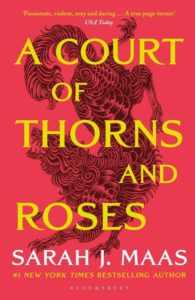Novel Kicks Writing Room: Combinations
 Welcome back to the Novel Kicks Writing Room. Today, it’s about combinations.
Welcome back to the Novel Kicks Writing Room. Today, it’s about combinations.
Pick a character from either something you’ve written or from the book you are currently reading. This is your main character.
Now randomly choose three more, each from different stories and as varied as you can make them.
Your main character is speed dating. One at a time, this character has a brief conversation with your other three choices before the bell goes off and they have to move on.
Write only using dialogue.
For each one, write for five minutes each time.
You could then always do other combinations within these characters. How would it work if your main character was suddenly the one who had to impress the others?
NK Chats To: Mandy Baggott
 Hello Mandy. Thank you so much for joining me today. Can you tell me about your new book, One Last Greek Summer and what inspired it?
Hello Mandy. Thank you so much for joining me today. Can you tell me about your new book, One Last Greek Summer and what inspired it?
One Last Greek Summer is a perfect summer read set on the Greek island of Corfu. It’s the story of newly divorced thirty-something Beth Martin and her friend, Heidi, having one last holiday before they both re-evaluate the next stage of their lives. Except Heidi has picked the destination they both first visited when they were 21, and there just might be a few familiar faces waiting for them…
How has your writing process changed since writing your first novel?
*laughs* Seriously, it hasn’t changed that much! The only thing that has changed slightly is I now write two books every year as opposed to one when I first started out. I still initially come up with main characters and setting, the very bare bones of an idea, and then I literally start to write. I am not a plan it all and stick Post It notes around the room kind of writer, I just haven’t got that in me. I think if I knew the beginning, middle and end of each story I’d get bored writing it.
Where do you like to write? Do you have any writing rituals?
I have two main places I write. I have an office at home and I also visit my husband’s office at Numeric Accounting in Salisbury three days a week to give me that true ‘getting up and going to work’ feeling. It’s amazing how productive you can be surrounded by a team of accountants… As for writing rituals, I don’t really have any of those, just keep the coffee coming! Oh, and we always go to the pub at lunchtimes on a Friday! That surely counts, doesn’t it?
How important is it to pick the right names for your characters?
This is SUPER important to me otherwise the characters don’t come alive or feel real to me. I remember one publisher (who shall remain nameless) at the very last moment, I think at the proofreading stage of things, wanted me to change the name and nationality of my hero. I was so shocked and I was absolutely not happy about it. I stuck to my guns and obviously I was right! It doesn’t usually take me long to come up with names but they do have to feel right for the characters.
What’s next for you?
I’m currently finishing writing Christmas! One Christmas Star comes out in e-book on 12 September and I am really excited about this book. It’s the story of schoolteacher, Emily and down-on-his-luck singer, Ray. It’s set in a festive London and involves a full-on school Christmas show – think Nativity meets A Star is Born – that’s how I pitched it to Aria Fiction.
NK Chats to… Jenni Keer

Jenni Keer
Hi Jenni, it’s great to be welcoming you back to Novel Kicks.
Thank you so much for having me back. I can’t believe my second book is out already. I had a real thrill ride with The Hopes and Dreams of Lucy Baker. The book had so many amazing reviews and I was delighted to get an Amazon bestseller flag. Let’s hope The Unlikely Life of Maisie Meadowsis as enthusiastically received.
Which fictional character would you like to spend the day with? What would you do?
This is such a hard question. In fact, I left answering it until the end because there are so many characters I could have chosen. I considered people from historical novels where I would get the opportunity to spend some time in an exciting period of history – perhaps with a Regency lady or a certain Victorian cotton mill owner *wink*. I thought about characters with special powers, like Harry Potter and various superheroes (flying through the air with Superman would be a blast). I considered the simple rural idyll that would be spending a day with Anne Shirley at Green Gables, or Miss Marple in her beloved St Mary Mead. Perhaps I could pamper myself and spend the day with someone wealthy or influential, perhaps party with Jay Gatsby, or Holly Golightly? So many fabulous characters, so many choices…
 In the end (wait for it…) it’s a toss up between Mr Daydream (who could give my imagination a boost and therefore some fabulous material for my novels) and Mr Impossible (so I can do EVERYTHING and ANYTHING) from the fabulous Mr Men. These were the very first books I read by myself and they have a special place in my heart. I’m sure I could have some up with something more intellectual but I’m embracing my inner child. Besides, I’m curious to see how they mange to drink a cup of tea with those stumpy little arms (Mr Tickle being the obvious exception).
In the end (wait for it…) it’s a toss up between Mr Daydream (who could give my imagination a boost and therefore some fabulous material for my novels) and Mr Impossible (so I can do EVERYTHING and ANYTHING) from the fabulous Mr Men. These were the very first books I read by myself and they have a special place in my heart. I’m sure I could have some up with something more intellectual but I’m embracing my inner child. Besides, I’m curious to see how they mange to drink a cup of tea with those stumpy little arms (Mr Tickle being the obvious exception).
Which songs would be on a playlist for The Unlikely Life of Maisie Meadows?
This is quite an easy question because Theo, who works with Maisie at the auction house, has a particular penchant for the 1980s. Although he is an expert in modern design (i.e. post-war) that’s the decade that really interests him, and this is reflected in his music taste. He plays a lot of The Jam, The Police, The Clash (late Seventies/Eighties) so a soundtrack would have to include these bands. This contrasts with the flamboyant Johnny (Maisie’s boss) who has more classical tastes, so perhaps some Mozart and a sprinkling of Shostakovich (as it is mentioned in the book). And then, to keep the author happy, I’d have to throw in a few recent dance tracks – which is largely what I listen to when I write. So it would be quite an eclectic mix.
 How did your writing process differ from your previous novel?
How did your writing process differ from your previous novel?
In many ways it was quite similar. I’m a pantser, not a plotter, so apart from the bare bones of the story and a definite idea of the ending, I do tend to launch myself in rather randomly, not even writing chronologically. However, for Maisie I had to produce a synopsis for the publisher before I began writing and this did help me focus my ideas a bit more. There was also a time pressure for Maisie, whereas Lucy was written before I had a publishing deal so I had longer to play about with it. However, deadlines are Good Things. They help you focus.
The only thing I really did differently was a mid-book plan. I always refer to my first draft as the Bowl of Dropped Spaghetti stage – because in my head that’s what it feels like. After that, I need to pick all the jumbled spaghetti up and sort it out. Writing Maisie was the first time I’d produced a coherent plan but it was only at this post first-draft stage. I put all the scenes I’d written on Post-it notes and then planned the book – a bit backwards but it worked. My clever techie son set me up with two screens and I simply pulled across sections in order onto a blank document. I am at the Bowl of Dropped Spaghetti stage with Book 3 now so shall employ this method again.
Which authors have inspired you?
Novel Kicks Fiction Friday: Something Valuable
 It’s Friday which means it’s time to start writing some fiction.
It’s Friday which means it’s time to start writing some fiction.
Fiction Friday is our weekly writing prompt. The aim is to write for a minimum of five minutes and then keep going for as long as you can. Once you’ve finished, don’t edit, just post in the comments box below.
Today’s prompt…
Your most valuable possession goes missing. You begin to chase the thief.
It takes you to parts of your home town you’ve never been before.
Carry on the story.
At some point, someone ends up dressed like a rabbit.
Novel Kicks Writing Room: Research
 Today, I wanted to focus on research.
Today, I wanted to focus on research.
When looking at the writing process, nothing scares me as much as the research part.
How much planning and research is enough? At what point can you get too buried underneath all of the information?
The most daunting question of all… where do I begin?
I wanted to try the following exercise.
Make a list of the first five celebrities or historical figures that come into your head. Then pick one.
Using google, spend thirty minutes finding out five facts about this celebrity or historical figure.
Once you’ve done that, write a conversation between yourself and this person using the information you’ve found out.
Has this exercise sparked a bigger idea? What else do you feel you’d need to know before you begin to write a bigger story?
Novel Kicks Writing Room – Autobiographical
 Writing about yourself.
Writing about yourself.
Set a timer for five minutes.
Write down as many memories from your own life that come to mind within the time.
From that list, pick the one that stands out the most and make as many notes about it, trying to remember as much as you can from how you felt, the smells, who was there. What happened and how it ended.
Once you’ve done that, use these notes to write a chapter as though you were writing your autobiography.
Give the chapter a title.
Novel Kicks Writing Room: Keeping a Diary
 Many of you have probably kept a diary at some point in your lives? It’s something I have done on and off through the years.
Many of you have probably kept a diary at some point in your lives? It’s something I have done on and off through the years.
They are definitely a window into what a person is like.
Using a character in your current work in progress, keep a diary from the point of view of your character. Do this for at least three days and maximum of five days.
How would they be reacting to current events? The race for Prime Minister, climate change? Love Island?
If you’ve not got a current WIP, choose an existing fictional character. I wonder how Elizabeth Bennett or Mr Collins would react to what is currently going on.
NK Chats To: Elizabeth Crocket
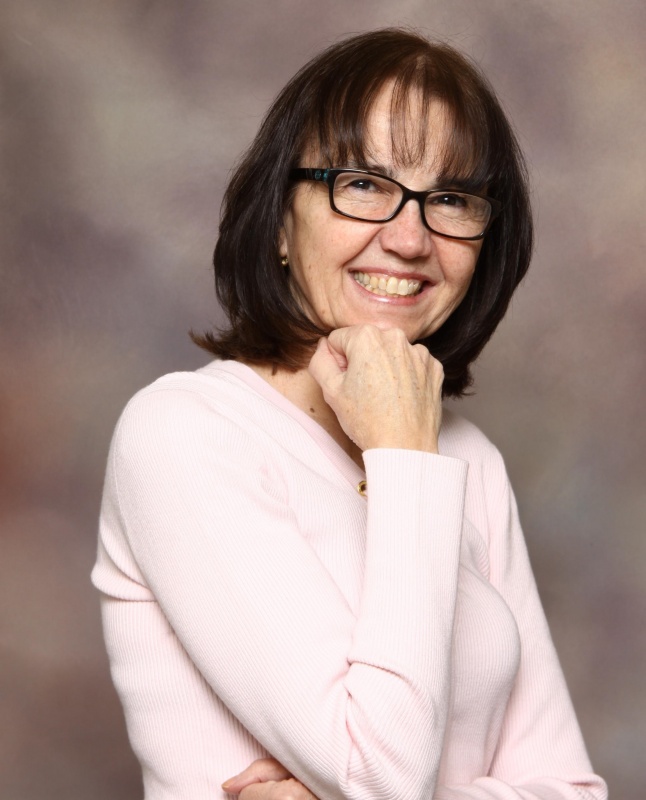 Hi Elizabeth, thank you so much for joining me today. Can you tell me a little about your book, Full of Grace and what inspired it?
Hi Elizabeth, thank you so much for joining me today. Can you tell me a little about your book, Full of Grace and what inspired it?
In Full of Grace, Angela keeps a roof over her head, albeit a leaking one, by writing romance novels. But Angela’s never really believed in the traditional happily ever after ending. So, she begins writing the story of Grace, who has recently been diagnosed with cancer shortly after finding out her husband Rick is having an affair. Again.
As she writes the story to dispel the myth of happily ever after, Angela begins a relationship with Mark, the contractor who comes to fix her leaking roof, and ironically, it looks like she may be on the way to her own happy ending. But Angela’s had a difficult past and has a cynical outlook, while Mark’s life has just gotten messy. Angela wonders if this is all going to work out.
Grace lies in bed at night, wondering if what Rick wants to give her, and what he is capable of giving her, are two different things. She asks Rick to move out temporarily, while they try to assess their marriage. She wonders how she can get such comfort and security from a man who cheated on her.
My inspiration for this book came when I was daydreaming one day, thinking it would be fun to write a book about two women with different story-lines, and two different personalities. I started to think of the character Angela, and what she would write about next. I decided she should write about a character who has cancer, as I could draw on my vast experience, having lost my parents to cancer, and having had cancer myself. I wanted a story-line about cancer to sound authentic, because I’ve read some that didn’t ring true to me. However, it isn’t all doom and gloom, there is some romance, fun and humour as well!
What’s your typical writing day like? Is there somewhere specific you like to write?
When I’m working on a novel, or writing anything for that matter, I don’t have a typical writing day. I tend to live and breathe what I’m working on. I’ve been known to be sitting at my kitchen table at 3:00 in the morning, jotting down something I’ve thought of in the night.
What’s your favourite word and why?
My favourite word. Hmm. This is where I’m wondering if I should be honest and say that it probably isn’t printable. (grin) But, I’ll choose a more suitable response and say that it’s each of my grandchildren’s names. That would be six words, though, so I’ll say “grandchildren”. Or “grace”, a quality I so admire. I really love words, we could be here all day!
Which authors have inspired you?
So many authors have inspired me. I jump between reading fiction, non-fiction and poetry. So, I’ll choose someone in those three categories that I’ve read this year. Elizabeth Berg, Michelle Obama, and Billy Collins. What a dinner party that would be!
What are you currently working on?
I have two books that should be released in the next year or so. Soon I will start edits on my third women’s fiction, The Smell of Roses. I also have my first children’s picture book, Happy Haiku, coming out within a year or so. And I am always working on some type of Japanese short form poetry, which is a great interest and love of mine.
What song best describes you?
Novel Kicks Fiction Friday: People Watching
 It’s Friday which means it’s time to start writing some fiction.
It’s Friday which means it’s time to start writing some fiction.
Fiction Friday is our weekly writing prompt. The aim is to write for a minimum of five minutes and then keep going for as long as you can. Once you’ve finished, don’t edit, just post in the comments box below.
People watch for ten minutes.
Once you’ve spotted someone who interests you (without making it obvious you’re studying them and being in danger of looking all creepy, hahahahaha,) write about them.
What has their day been like so far? Who are they? Where are they going? What do they look like?
Novel Kicks Writing Room: Free Writing
 Today, I thought we could keep it nice and simple and do some free writing.
Today, I thought we could keep it nice and simple and do some free writing.
I like this kind of exercise as you never know what is going to come out of it.
Set the alarm for ten minutes. Start writing and don’t stop. See if you can get to five hundred words in that ten minutes.
Just in case you need a little inspiration, I have posted some prompts below.
Enjoy.
Prompt 1:
With a deep breath, she opens the box.
Prompt 2:
The music started and he knew he couldn’t do it.
NK Chats To… Claire Wingfield
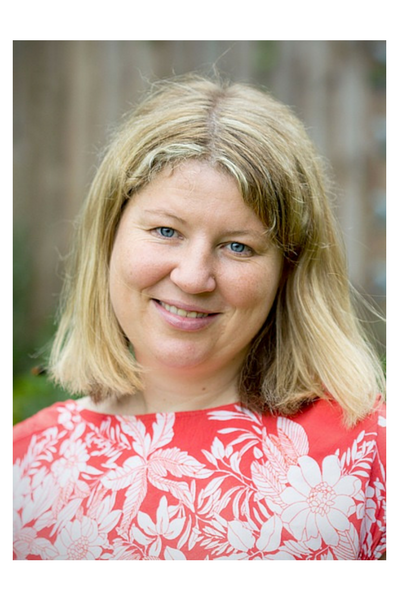 Hi Claire, thank you so much for joining me today. Can you tell me a little about your book, Saving Francesca Maier and what inspired it?
Hi Claire, thank you so much for joining me today. Can you tell me a little about your book, Saving Francesca Maier and what inspired it?
Saving Francesca Maier takes place over a summer in Berlin, when a family arrive to visit old friends in the city, disturbing secrets that have long lain dormant.
Having grown up in the UK, my first job as a young graduate was in Berlin and the book was inspired by those two transformative years in my life, during which I felt an exhilarating – and at times terrifying – sense of freedom. It seemed natural to put those intense emotions into the character of Francesca, an adolescent girl on the cusp of change when she’s brought to her father’s home country for the first time.
What’s your typical writing day like? Is there somewhere specific you like to write?
With two young children and a busy editorial business, my writing is often squeezed in at the edges of the day. I like to write before the rest of my family is awake but also find many of my ideas come when I’m not at my desk. Writing Saving Francesca Maier, quite a few plot ideas came to me whilst swimming and at least one of the scenes is inspired by a yoga pose!
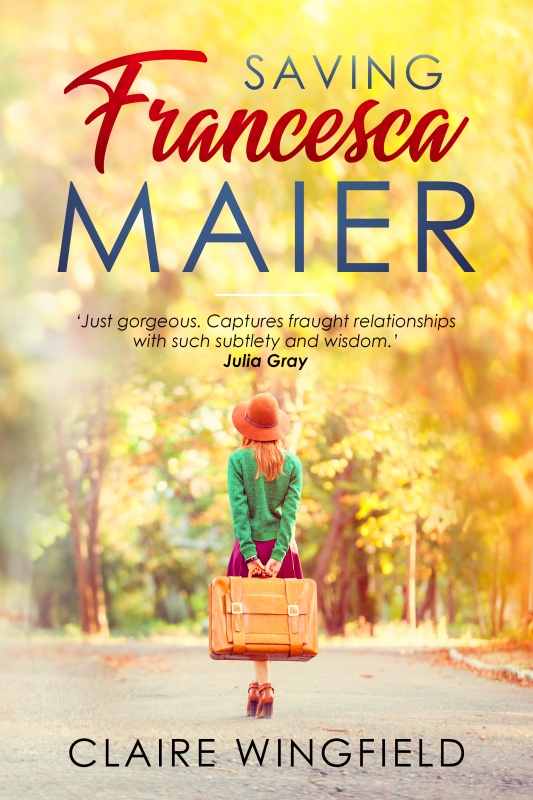 What’s your favourite word and why?
What’s your favourite word and why?
Change.
In writing and in life I am always reminding myself to appreciate that people can make quite incredible transformations. It’s those transformations that can provide a lift and new momentum to a narrative and a sense of hope in life. Some of us are too often told that people can’t change and that’s when we get stuck in our place in life and our emotions. Reading novels can remind us that other paths are possible, and part of my writing has been inspired by the personal transformations of people I’ve known – especially those that come after many years of one way of being. There’s an important shift in mindset for one of the characters in Saving Francesca Maier which needed a catalyst but also required incredible bravery to stick to, once my character glimpsed that change was possible.
Which books have inspired you?
Novel Kicks Fiction Friday: The Whimsical Fairy
 It’s Friday which means it’s time to start writing some fiction.
It’s Friday which means it’s time to start writing some fiction.
Fiction Friday is our weekly writing prompt. The aim is to write for a minimum of five minutes and then keep going for as long as you can. Once you’ve finished, don’t edit, just post in the comments box below.
Today’s prompt: a whimsical fairy.
Your character is a fairy who is, well, away with the fairies in her/his own little world. They have earned their wings but on their final warning.
Your setting is a secret room in a library. In this room, there are boxes filled with…..
Continue the story.
Novel Kicks Writing Room: Free Writing
 For our writing group today, it’s a bit of free writing.
For our writing group today, it’s a bit of free writing.
I have started a story below. Writing for a minimum of five minutes, continue the story. You can either keep the current POV or maybe carry it on using the point of view of the person being followed?
Have fun.
*****
I watch from the other side of the road whilst she waits in line for her coffee. She hasn’t spotted me. Her head is looking down at the phone in her hand; a small smile plays on her lips as her fingers fly across the screen.
I wonder who makes her smile like that. An agonising feeling of jealousy rises but I quickly try and brush it aside. I need to keep my focus. I am so close.
I come out of the shadows and begin to follow her when I see her finally leaving the busy coffee shop, almost loosing her in the crowds of people on the pavement. I keep my distance, careful not to be seen.
A Moment With… Effrosyni Moschoudi
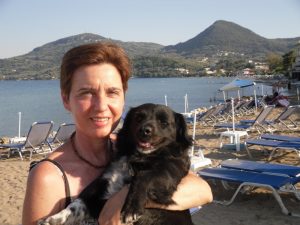 Effrosyni Moschoudi is the author of The Raven Witch of Corfu series.
Effrosyni Moschoudi is the author of The Raven Witch of Corfu series.
She is joining me today to talk about how Corfu has inspired her writing.
*****
My love affair with Corfu began when I was only a child. Ever since I was about five years old, my Corfiot grandparents used to have me over for long periods every summer, first in Corfu town, then in the village of Moraitika.
Moraitika is situated on the southeast coast of the island between Benitses and the port of Lefkimmi. Back in the 1980s, Moraitika was a bustling holiday spot. My family ran both a souvenir shop and a small business of room rentals at the time, which meant I had plenty of opportunities to mingle with tourists on a daily basis, Brits mostly.
My sister and I often spent three-month holidays in Moraitika as youngsters, where we helped our grandmother with the cleaning of the rented rooms. Yet, there was always time for plenty of swimming and sunbathing, as well as for having fun in the evenings with a host of cousins and friends. This time of my life remains the most precious I hold in my heart, and this is even more so the case now that my grandparents have passed away.
 I have strong family roots in Moraitika. My great-grandfather, the teacher and priest of the village in the turn of the 20thcentury is buried beside the old church. Part of his home that’s still standing in its entirety near the church was originally used as the school of the village. Today, it has been split up into small apartments which stay closed for most of the year and only come to life for 1-2 weeks at a time when descendants of my great-grandfather (my cousins, aunts and uncles) arrive for a short holiday. Having inherited the part of the house that once belonged to my grandparents, it is a precious bond with that special part of my life that literally comes to life for a few days every summer when I stay there.
I have strong family roots in Moraitika. My great-grandfather, the teacher and priest of the village in the turn of the 20thcentury is buried beside the old church. Part of his home that’s still standing in its entirety near the church was originally used as the school of the village. Today, it has been split up into small apartments which stay closed for most of the year and only come to life for 1-2 weeks at a time when descendants of my great-grandfather (my cousins, aunts and uncles) arrive for a short holiday. Having inherited the part of the house that once belonged to my grandparents, it is a precious bond with that special part of my life that literally comes to life for a few days every summer when I stay there.
Beside Moraitika, and across the river of Messonghi, lies a small fishing village of the same name. Unlike Moraitika that kept getting more built up over time, Messonghi has changed very little since I’d first laid eyes on it in the 1970s.
Novel Kicks Writing Room: Plotting and Timelines
 Plotting and timelines.
Plotting and timelines.
I am fast realising that I am one of these writers that has to know what is happening in my story; the experiences of National Novel Writing Month has taught me this.
I have been finding this method below quite helpful in plotting my story. This is something I have featured before but thought it worth revisiting.
Grab either a pad of Post-It notes (author Julie Cohen swears by Post-It notes) or some bits of paper and write out all of the current plot points for your current work in progress; all the things you have so far (and don’t worry if you don’t have the end yet. Neither do I.)
Also, if you aren’t currently working on anything, as always, you could pick a published story.
NK Chats To… Beth O’ Leary
 Hi Beth, thank you so much for joining me today. Can you tell me about your book, The Flatshare and what inspired it?
Hi Beth, thank you so much for joining me today. Can you tell me about your book, The Flatshare and what inspired it?
Thank you so much for having me! The Flatshare is a story about two people who share a one-bed flat but don’t meet: one works nights, the other works regular hours. It was inspired by my own experiences of moving in with my boyfriend when he’d just started work as a junior doctor and was working lots of night shifts. We would go days on end without seeing one another – he’d get home from work just after I’d leave in the morning and vice versa, so we passed like ships in the night. It got me wondering what might happen if two strangers lived that way…
What’s your writing process like from idea to final draft?
For me, the basic concept is often what comes into my head first: in this case, two people sharing a bed but not meeting. The main characters come next, growing out of that: so here, I asked, why might two people be willing to do that? What sorts of people would they be?
I generally do a rough plan after that point, which features some key moments I want to happen in the novel, but then I rarely look at that plan again once I get writing. For me, first drafts tend to snowball – I write very quickly, almost with the sense that I’m trying to keep up with the story, and then when I hit the end of the book I go back and do a lot of work from that point onwards. The first draft gets the raw, emotional stuff down, the clay of the story – the second draft is all about shaping that into something.
Do you have any writing rituals and somewhere special you like to write?
Well, I wrote The Flatshare on my commute to and from work, so after a while that became my writing ritual – it took me ages to get used to writing full-time at a desk at home after that! I often listen to music while I write, and tend to create playlists for stories. These playlists are especially useful when I’m editing, because they get me back into the character’s heads even when I’m looking at the book more analytically.
Novel Kicks Fiction Friday: What’s in the Cupboard?
 It’s Friday which means it’s time to start writing some fiction.
It’s Friday which means it’s time to start writing some fiction.
Fiction Friday is our weekly writing prompt. The aim is to write for a minimum of five minutes and then keep going for as long as you can. Once you’ve finished, don’t edit, just post in the comments box below.
Today’s prompt:
You are sitting in a chair when your child comes up and sits next to you. Out of nowhere, your child looks at you and says…
‘Daddy/Mummy, who is that in the cupboard upstairs and why are they sleeping when it’s not bed time?’
Begin with the above sentence.
Novel Kicks Writing Room: Speaking Differently
 Today, I wanted to focus on the various speaking styles of characters. I
Today, I wanted to focus on the various speaking styles of characters. I
Each character needs to have their own specific voice.
Write two pages of dialogue.
One character only speaks in short sentences whilst your other character is a bit more of a chatterbox. They speak in longer sentences.
Has this achieved two distinctive voices?
NK Chats To: Roxie Cooper
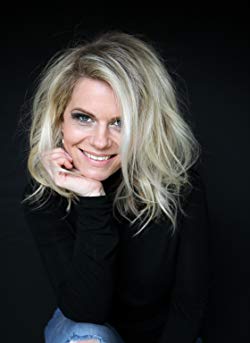 Hi Roxie, it’s a pleasure to welcome you to Novel Kicks today. Your book is called The Day We Met (released today. Yay.) What’s it about and what inspired it?
Hi Roxie, it’s a pleasure to welcome you to Novel Kicks today. Your book is called The Day We Met (released today. Yay.) What’s it about and what inspired it?
Hi, thanks for having me! The Day We Met is novel about meeting the right person at the wrong time and it asks the question; what happens if you meet your soulmate when you’re just about to marry someone else? Stephanie and Jamie are both happy with other people when they meet each other, but they can’t ignore the strong connection and chemistry between them. Unwilling to slip into a typical affair, they decide to meet on the same weekend every year, as friends. The novel spans a ten-year period and we see how the relationship affects them, their marriages, and careers.
I wanted to write a different kind of love story, one which reflected modern times and attitudes. I’ve always been intrigued by people’s varying opinions on physical and emotional infidelity; is one worse than the other? How do emotional affairs start and just how damaging are they? It’s a huge grey area which sparks monumental discussion and, as a former lawyer, they’re something I love exploring. But it was when I heard Paloma Faith’s Only Love Can Hurt Like This one day that the novel became fully alive in my mind. I knew this had to be an epic love story about two people who couldn’t be together but couldn’t be apart either. That was also the moment I decided that the novel would have to be set to music.
What’s your typical writing day like, where do you like to write, do you prefer silence and is there something you need to do/have before you begin writing (coffee for example?)
Sorry to be really awkward, but I have different routines for different stages of the writing process! When I’m writing the actual book, I adopt a fairly strict routine but it’s carried out in a nice environment. So, I’ll drop both my kids at school then dash to a coffee shop on my local high street. Both of my previous books were written there. I don’t stop until I’ve written at least 1000 words and I need my iPod on with people walking around. I like being in the middle of the hustle of it all and I stay there until it’s time to pick the kids up again. Once I move onto edits, however, everything changes. I lock myself in the house and have the TV on at a barely audible volume – I need a tiny amount of white noise. I have to drink coffee in the morning, switching to tea in the afternoon. I turn into a complete recluse in this period, I don’t see my friends for months. It’s very extreme but it works for me!
Which author or book has most influenced you?
I’ve read so many books by authors I’ve admired, but in terms of ones who have influenced my career, I’d have to say Adele Parks. I read her novel, Playing Away, in my 20s and thought it was such a standout, brave debut. I researched the author and discovered that she, too, was from Teesside – I couldn’t believe it! That was the moment I thought ‘Wow – if someone from Boro can become an author, there’s hope for any of us.’ It was around this time I started to have ideas about a novel of my own but hadn’t started writing it yet (that book turned out to be my debut The Law of Attraction), but each time I read another of Adele’s books, it cemented my ambition.
What made you first realise that you wanted to be a writer?
I’ve always loved reading, but I was never one of those kids who wanted to write – or an adult, for that matter. The idea came to me after I became disillusioned with my former career as a criminal barrister. I come from a very working class background and would tell all my friends about the outrageously silly traditions and rituals I had to participate in at the Bar. Coming from Teesside, I’d tell the stories through a very unimpressed ‘Boro lens’ and they’d all say to me “You need to write a book about this!” I also got so fed up with people saying to me “You really don’t look like a barrister!” so in 2009 I started writing my debut novel The Law of Attraction – a book about a blonde, working class, intelligent, sassy girl from Teesside who is propelled into the posh world of barristers. I hadn’t even considered writing a book before I was 31 years old.
What’s your route to publication?
I did a lot of research before I submitted my debut novel to agents. My first novel was the only book I’d ever written and took me about 16 months to write. When I felt it was polished enough to allow an agent to read, I sent it off to three I had my eye on (which was terrifying!). Sarah Hornsley from The Bent Agency requested a full manuscript within 24 hours. I was a nervous wreck! Sarah called me and we had the most amazing chat. I knew then that she was the right agent for me. She made suggestions on how I could improve the manuscript (which I did) and six weeks later she offered representation. The next step was submitting the novel to publishers. I had offers from two publishing houses and The Law of Attraction was eventually published in June 2017 with the Harper Collins imprint, HQ Digital.
Novel Kicks Writing Room: Different Orders
 This week, I wanted to focus on how moving plot events around, you can change/improve the story.
This week, I wanted to focus on how moving plot events around, you can change/improve the story.
Write down the following four plot points, each on a separate piece of paper. Put them into a jar or a hat and take them back out one at a time, lining them up.
This is the new order for the story. Write your own version using this order.
Cinderella is told she can’t go to the ball.
Cinderella meets the Prince.
Cinderella loses her shoe.
Cinderella gets married.
How does the story change once you’ve moved it around?
NK Chats To: N. Lombardi Jr
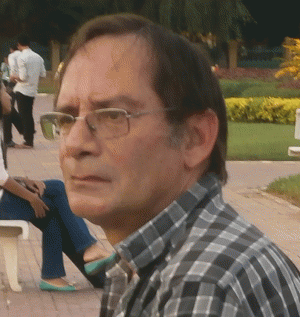 Hello Nicholas. It’s great to welcome you to the blog today. Please tell me a little about your new book, Justice Gone and what inspired it?
Hello Nicholas. It’s great to welcome you to the blog today. Please tell me a little about your new book, Justice Gone and what inspired it?
Justice Gone was inspired by a true event, the fatal beating of a homeless man in a small Californian town. This was such an extreme case, and one which did not include any racial elements, that it exposed the utter abuse of authority in which an outraged public reaction was inevitable. The town was Fullerton, the man’s name was Kelly Thomas, and the year was 2011. Although the police officers were indicted by a grand jury, they were acquitted in their trial. So I asked myself a question: if someone felt that justice was denied the deceased, would they take it in their own hands? This became the seed for the story.
What elements do you feel need to be present in a thriller novel? What are the challenges?
Suspense, that is, the anticipation of what is going to come next, and this is usually accompanied by actions to some degree, although if you have enough skill, words alone can create this tension. Whichever way you accomplish this, the challenge is to persuade the reader to invest their interest in what is going on, and this includes sympathy for the protagonists.
This is the first part of a series featuring Dr Tessa Thorpe. What advice do you have for someone trying to develop a series and a strong character that will keep them coming back to read their story?
You need to become friends, or even love the character, knowing their faults as well as their admirable traits. In this way you know what they will say and can predict what they’ll do in any situation.
Actually Tessa first appeared in Journey Towards a Falling Sun, a story I wrote over 30 years ago, but eventually got published in 2014. It was a minor role, but one in which she was born, so to speak.
What’s your typical writing day like, where do you like to write and do you prefer silence?
I can write in the early mornings when I’m fresh, or in the evenings when I’m relaxed. usually the time between is non-productive. Silence is mandatory.
What’s your favourite word and why?
I don’t have a favourite word. I have a favourite colour, blue. Can I then say that “blue” is my favourite word?
Novel Kicks Writing Room: Connecting Memories
 Today, I thought we could try and connect three seemingly unrelated memories.
Today, I thought we could try and connect three seemingly unrelated memories.
Write about three separate memories. These can be yours or they could belong to someone else.
Each one should be about fifty words.
Once you’ve done that, try and connect these three unrelated memories into one coherent story.
Three memories I have thought of off the top of my head are my Mum and Grandfather teaching me to ride my bike, My Grandmother’s first day of senior school and the day I got married.
Is what you’ve written something that could be used for a bigger project?
NK Chats To… Steven J. Gill
 Hi Steven. Welcome to Novel Kicks. Can you tell me about your novel, The Rock ‘N’ The Roll ‘N’ That and what inspired it?
Hi Steven. Welcome to Novel Kicks. Can you tell me about your novel, The Rock ‘N’ The Roll ‘N’ That and what inspired it?
The novel in very simple terms is about a band.
A middle-aged man stumbles across said band as they prop up the bill in a subterranean haunt in Manchester.
He offers to manage them, and their journeys begin.
The backdrop is essentially to highlight love and friendship and the insecurities/successes/predicaments that middle-age can bring.
In terms of what inspired the novel, I’d previously read a book that used the music industry as a backdrop but felt it could be done better. I then attended the inaugural Festival Number 6. In North Wales and after an enjoyable afternoon at the literary stage, had somewhat of an epiphany and decided I would set to and get my book written.
The coupling of the music industry and this ‘new-breed’ of middle-aged felt like it had a lot mileage. Forty-something is now such a different beast in comparison to previous generations. And that opens a wealth of possibilities and jacking your job in to mange a band is well within the realms of possibility this day and age.
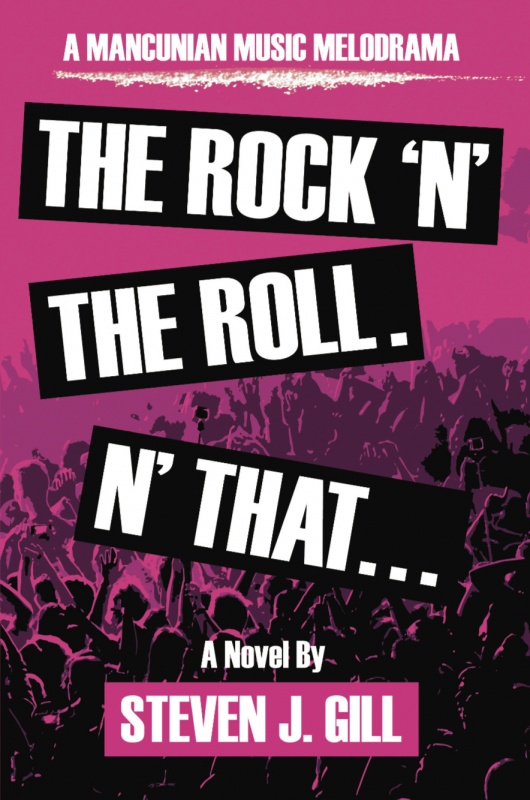 What’s your typical writing day like, where do you like to write and do you prefer silence? What keeps you motivated when writing?
What’s your typical writing day like, where do you like to write and do you prefer silence? What keeps you motivated when writing?
It tends to fit in around work and I work in a room with a table, a huge bookcase and a stereo. I like to write for a couple of hours at a time. And I do very little in silence!
A perfect writing day involves no work. Get up and do a couple of hours. Go to the gym. Come back and eat couple more hours writing. Go for a walk for an hour mid afternoon and then a couple more hours writing. Breaking the creative process up allows for thinking time.
Motivation is progress in simple terms – be it writing or editing etc.
What’s your route to publication?
I ran a social media crowdfund campaign to gauge interest and to ‘out’ myself as a writer. The response was great, and I used the monies to get the book professionally edited and launched via Clink Street.
Do you have a favourite word?
Tough question and it can easily change from day-to-day – much like my favourite Beatles track – but let’s say preternaturally today.
Novel Kicks Fiction Friday: A Time For Firsts
 It’s Friday which means it’s time to start writing some fiction.
It’s Friday which means it’s time to start writing some fiction.
Fiction Friday is our weekly writing prompt. The aim is to write for a minimum of five minutes and then keep going for as long as you can. Once you’ve finished, don’t edit, just post in the comments box below.
Pinch punch first day of the month.
Your character finds themselves overwhelmed when they experience three big firsts in one day.
Their age, gender, job is up to you.
Novel Kicks Fiction Friday: Wishing
 It’s Friday which means it’s time to start writing some fiction.
It’s Friday which means it’s time to start writing some fiction.
Fiction Friday is our weekly writing prompt. The aim is to write for a minimum of five minutes and then keep going for as long as you can. Once you’ve finished, don’t edit, just post in the comments box below.
‘I am always wishing for.’
Starting with that line, write about someone (usually sad, cynical and bitter) who suddenly finds themselves with one wish.
However, the wish comes with a price and a choice that has to be made.
There will be a consequence.
Novel Kicks Writing Room: Getting Started
 Getting started.
Getting started.
One of the things I obsess over too much is the first sentence. It is supposed to hook the reader.
Something to be remembered though…this is not something that is important with a first draft. Everything can be changed in editing (repeating this to myself like a mantra.)
Pick one of the following sentences as a starting point and then write for three minutes.
Once you’ve done this, you could find one that applies to your book idea.
‘I tried to leave the rabbit stopped me.’
‘When Lana opened the book, something took over.’
‘When he/she stepped into the attic, it was like stepping into the past.’
‘He/she wanted this moment to end. How was another matter.’
NK Chats To: Jenni Keer
 Hi Jenni, thank you for joining me today. Your novel is called The Hopes and Dreams of Lucy Baker. Can you tell me about it and what inspired the story?
Hi Jenni, thank you for joining me today. Your novel is called The Hopes and Dreams of Lucy Baker. Can you tell me about it and what inspired the story?
You are very welcome – it’s lovely to be here. Your virtual sofa is very comfy!
Hmm… how to sum up my book. I guess The Hopes and Dreams of Lucy Baker is a heart-warming story with a variety of themes. I set out to write a romance but the book became so much more and, in a way, is two love stories; Lucy and George, but also Lucy and Brenda. It was the powerful intergenerational friendship between these two women and how they deal very differently with Brenda’s dementia diagnosis, that became the central theme. For the romance, I was initially inspired by a locket of my mother’s and my working title was Lucy’s Locket until it was picked up by the publisher. This mysterious piece of jewellery leads to lots of mishaps and comedy moments for Lucy but also makes her reassess her romantic options in life. It was a fun book to write.
What’s your typical writing day like? Do you need coffee? Silence?
I weave my writing around part-time work, care for my mum and the hectic taxi service I appear to be running for my four teenage sons. My most productive times are during the school day – when the house is silent, and evenings – when it is not. I also work at the weekends when I can. I’ve developed a cunning strategy that involves wearing enormous headphones as a signal that I’m writing. If there is a lot of noise, I play music (I have a playlist of familiar songs so I’m not distracted by them) but I also cheat and pretend I’ve got music on so the boys leave me alone. It’s coffee during the day, and wine or tonic water at night – although the wine is only for weekends. Interestingly, some of the best comedy scenes have been wine-fuelled.
The other thing I do, to combat the isolation and to spur me on, is to meet up with my writing buddy, Clare Marchant, in our “virtual” office. It means we check in throughout the day with wordcounts and this accountability helps us both to focus. I do hate it when she leaves the virtual biscuit tin empty though…
Do you have a certain place you like to write?
I have an office – which is actually a desk in the corridor between the living room and the downstairs loo. I’m lucky to have this permanent space as a lot of writers work on the kitchen table or on their laps. It’s a total mess, like Lucy’s desk, but it’s mine. I have two screens set up (invaluable for editing) so it’s tricky for me to move. Research and planning I can do anywhere.
What’s your writing process like from planning to editing?
Planning – ha ha ha. You are funny. I am such a pantser and every time I begin a new novel I’m determined to plan. My second book for Avon (out next summer) was the first time I’d had to write a synopsis before writing the book and boy was that hard – but I did it. I’d like to get better at planning, but my brain doesn’t work that way and I’m what I like to call “an onion writer” – I write in layers. I get a rough first draft down and then I go over and over and over it, perfecting, editing, adding description etc. until I’m happy. Luckily, I love editing and always see it as an opportunity to make the story even better. Some of my best ideas come right at the end of the process and then I have to go back and weave it all in. I honestly don’t know how people plan.
NK Chats To… Gila Green
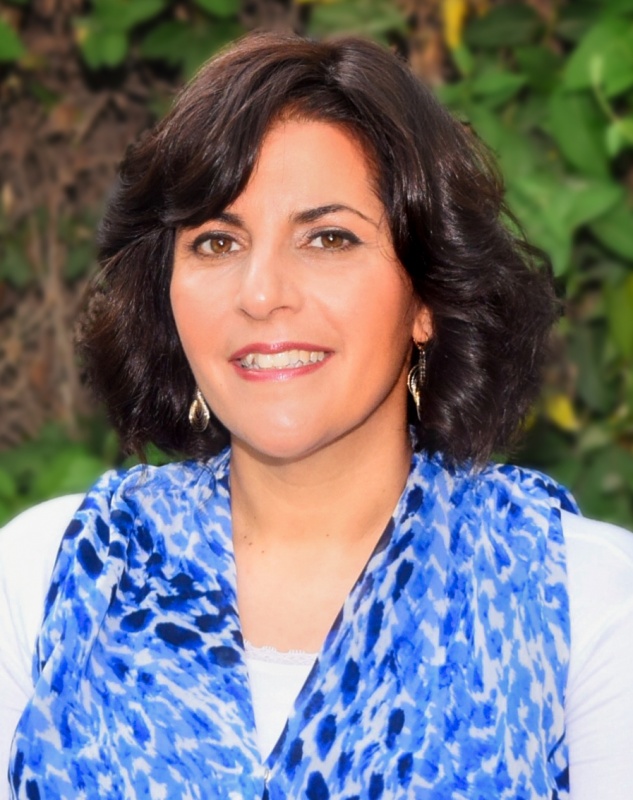 Hi Gila, thank you for joining me today. Your novel is called Passport Control. Can you tell me about it and what inspired the story?
Hi Gila, thank you for joining me today. Your novel is called Passport Control. Can you tell me about it and what inspired the story?
Passport Control is a coming of age novel about a twenty year old Canadian girl who feels forced to leave the home she shares with her father and, in her desire for revenge, goes to the one place he’s kept a secret all of his life, his home country Israel. Other than odds and ends, she doesn’t know anything about his past life there.
She finds herself in a dormitory with a range of Israelis from Jewish to Arab and struggles to navigate her way through the politics and culture around her. Along the road she falls in love, encounters murder, and discovers a shocking family secret.
The story was originally a short story written in a creative writing class with author Steve Stern. It was inspired by my own experience coming to Haifa University around the same age as my heroine, Miriam Gil and similarly struggling to navigate my various roommates, who all came from different cultures and backgrounds. At least that was the initial kernel behind my twelve-page short story. It evolved over time into a father-daughter story, and a family betrayal story with a side order of romance.
What’s your typical writing day like? Do you need coffee? Silence? Do you have a certain place you like to write?
I have five children between the ages of 11 and 20. So my writing day has evolved over time with the ages of my children.
In the early days, I used to type a lot one-handed while nursing and later had to be done by 1 p.m. when nursery school closed.
Now, I have a lot more quiet during the day–which is vital for me to write–and yes, rivers of coffee. I write in my converted bomb shelter adjacent to the front door, so my writing is punctuated all day with, “Mom, is there any food?” as the kids come and go and the snoring of my dog.
What’s your writing process like from planning to editing?
My writing process has changed a lot over the years. I am much more of a planner these days.
I try to write at least two sentences for each chapter that explain the point of each one. At a certain point, I just write and usually the first three or four chapters are the first to go later on as I “write myself into the story.” But not always. Each novel is its own journey.
I don’t wait for perfection if that’s what you mean. You just have to dive in.
What’s your favourite word and why?
My favorite word is balagan. That’s a Hebrew word with no single English translation.
It means mess, disorder, confusion but also problem and difficulty.
So, you could say, “today was a balagan,” or “my thoughts are a balagan” or “your room is a balagan!”
Try it! It’s a fun word to say.
Which song best describes you?
“Shout” by Tears for Fears.
What elements do you think make up a good novel?
Great novels are written by authors who excel at location in time and space.
If you feel as if you are really in Elizabethan England or in South Africa during Apartheid, or in downtown Toronto…you’ve got the elements of a great novel. I can’t think of a time when someone told me they loved a short story or novel and couldn’t tell me exactly where and when it was taking place.
Full disclosure: I teach an online Setting & Description course and I can’t believe how many new writers send me first drafts that take place Anywhere / Anytime. It’s not as intuitive as you might think.
NK Chats To… Julie Houston
 Hi Julie. Thank you so much for joining me today. Your new novel is called A Village Affair. Can you tell me about it and what inspired it?
Hi Julie. Thank you so much for joining me today. Your new novel is called A Village Affair. Can you tell me about it and what inspired it?
Hi, and thank you so much for having me on your blog today. It’s much appreciated.
As writers, we’re always advised to write about what we know and “AVillage Affair”began its life under the guise of ‘Not in My backyard’ influenced, very much, by a real-life fight in my village where acres of fields and greenbelt land were in danger of having hundreds, if not thousands, of houses built upon them. As the main focus of the plot moved and centred upon the village school, the novel took on the handle “Little Acorns” and many of the school incidents are based on real happenings in the primary schools I have taught in over the years. Eventually Aria came up with the title “A Village Affair”which I love and which, I think, encompasses the different strands of the book.
What’s your writing process like (idea, research etc.) How do you approach editing?
At the start of a new idea/novel I sit at my desk with a brand-new exercise book. I like my novels to be very much character-based and so I come up with characters’ names, write what they look like and actually give them a family tree. This is important as I’m mainly writing about the characters in one town and one village and so I have to make sure they’re not too related to each other, especially if they’re going to end up together!! With “Holly Close Farm”,as nearly half of it is set during WW2, I did a huge amount of research about the WAAFs and Bomber Command. I really enjoyed this bit and it was quite hard work leaving the reading to actually write. I love editing. I must be the only writer who enjoys this bit. I love going back over what I’ve written, tweaking and adding and crossing out. In my early days as a writer I would write one chapter and then edit it to death the next day because I was so proud that I’d actually written another chapter. Now, with deadlines, I tend to just write and edit at the end. Editing means I’ve finished, which is always wonderful.
What’s your typical writing day like? Do you have a place to write? Cup of coffee? Write in silence?
I’m a lark: I’m much better writing at 6am than later in the day. I had the most beautiful writing room at one end of the house but my husband is now working from home and has commandeered it for his office. I’m in a cupboard – not literally, but it feels like it after the lovely office with views down the valley. I actually quite like my cupboard: it’s jampacked with books, piles of papers, computer and, usually, the dog. I write, plan for school if I’m teaching a couple of days and do some private tuition in there. It does tend to get a bit cosy. One day, I’ll have my office back!
I need silence, tons of coffee (morning) and Earl Grey tea (afternoon).
So, basically, if it’s a writing day, I’ll get up early, have a mug of hot water and lemon (my mum always did and I’ve done this for the past 30 years) answer emails, decide whether it’s a swim or a run, shower, have breakfast and read the paper about eleven and then really get stuck in. If I can write 2-3000 words a day I’m more than happy.
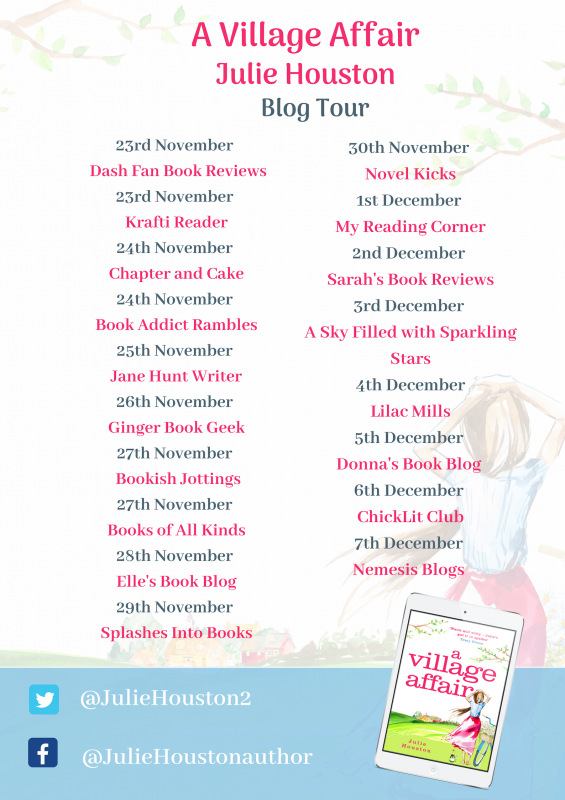 What’s the most challenging thing with writing a novel?
What’s the most challenging thing with writing a novel?
The start of any new novel. By the end of a novel I love my characters so much I can’t bear to leave them and start again. I feel very disloyal to my old friends and it takes a while to love the new ones.
How do you pick names for your characters?
Probably with names I wanted to call my own children but for which my husband didn’t share the same enthusiasm. So India, Clementine, Kit, Theadora and Fin were born! My daughter, Georgia, is really cross I didn’t stick to my guns and call her Theadora – shortened to Teddy – that Harriet names one of her twins.
In my “Work in Progress“(Book 7 and desperate for inspiration for an actual title) it’s been easy to come up with names because I have Patrick, the father – a bit of a lothario – who is a Cambridge educated Classics professor and gives all his four daughters names from Greek literature. I’ve ended up with Isolde, Pandora, Juno and Lexia.
What elements make up a good novel?
When I read, I want a thumping good story. I want to know what happens next. I want to want to go to bed read to know what’s going to happen. I do like humour in a novel. It doesn’t have to be overtly laugh out loud. I think Liane Moriarty and Kate Atkinson are both superb writers, not only at weaving good stories but at having the ability to include some quite subtle humour. I aspire to both these wonderful novelists!!
NK Chats To… Alison Sherlock
 A Way Back Home is the new novel from Alison Sherlock. Hello Alison, thank you so much for joining me today. Your new novel is called A Way Back Home. Can you tell me a little about it and what inspired it?
A Way Back Home is the new novel from Alison Sherlock. Hello Alison, thank you so much for joining me today. Your new novel is called A Way Back Home. Can you tell me a little about it and what inspired it?
A Way Back Home is the third book in my Willow Tree Hall series, although they can each be read as standalone books. The story is about Will Harris, younger brother and ‘spare’ of the heir of Willow Tree Hall, his big brother Sam who was the hero in the first book, A House To Mend A Broken Heart. Will was great fun to write as I always pictured him as a playboy with a wickedly dry sense of humour but somewhat set apart from the rest of the family. Therefore it was only right that the heroine of the story would be a free-spirited woman called Skye who is the total opposite of Will!
What’s your typical writing day like? Is there somewhere you like to write? Write in silence? Cup of coffee or tea?
I walk Harry, our daft golden retriever, first thing in the morning and then spend the next hour trying to wipe off the mud which he has inevitably brought home with him. Once he’s sleeping off his big walk and snoring happily, I can finally get to work for the rest of the day. I always write on my laptop at a desk with the music on to begin with. And always with a large mug of coffee to hand!
What’s your editing process like?
I do a little editing as I go along but mostly I like to get the whole story down first. A Way Back Home was written in just over 9 weeks, the quickest I’ve ever done. Hopefully that’s a good sign…!
If you found yourself with an airstream trailer and time, where would you go and why?
I love America but have never seen the middle of the country so it would definitely be next summer driving right across the southern states. Hopefully my husband would be driving as I’d be as hopeless towing a trailer as Skye is in the story!
NK Chats To… Amelia Mandeville
 Amelia Mandeville joins me today. Her debut novel, Every Colour of You is released tomorrow by Sphere. Hi Amelia, thank you so much for joining me today. Your book is called Every Colour of You. Can you tell me a bit about it and what inspired the story?
Amelia Mandeville joins me today. Her debut novel, Every Colour of You is released tomorrow by Sphere. Hi Amelia, thank you so much for joining me today. Your book is called Every Colour of You. Can you tell me a bit about it and what inspired the story?
Hello, thanks so much for having me!
My book follows the journey of Tristan, who is struggling with his mental health, and Zoe, who is the most positive person you’ll meet. It’s all about their friendship as very different people. I think my own personal struggles with mental health made me write this story. I also think it’s important for boys to be able to know that they can cry, they are allowed to not be okay, and talk about it.
What is your writing process like from research and plot development to editing?
It’s different for each book. This one, I spent a little bit of time planning, writing down certain lines I really wanted Zoe or Tristan to say, their characteristics. Then when I had the ending set in stone, I started writing. The editing was thorough, we did a lot of drafts before it got to my final draft, and I felt it just got better and better. My book would not be how it is, without Abby and Manpreet who edited.
Do you have any rituals when writing – a certain place to write, coffee, music, silence?
Music. I always have to listen to music. I think of my most chapters to myself when I’m driving on my own, listening to a song. There’s something about music. It really just gets me in my zone. Specifically sad, emotional, music.
Which author/book has most influenced you?
I think I always found Veronica Roth so successful, writing at such a young age. And obviously JK Rowling. Despite all those rejections, but her true talent eventually was recognized. I tried to remind myself that whenever I got rejections (I got a lot). I’m not saying I will ever be on the level of JK Rowling, but if she gave up, we would never have Harry Potter.
What is the best part of writing and what did you find the most challenging?
The best part is creating characters that you feel so much emotion and love with, its lovely. The hard part is the self-criticism, and comparison. Also when you hitting a writing block. I really do doubt my writing abilities when I’m in that state of mind. But once you’re out it’s back into doing what you love again.
Are you working on a new book? Are you able to tell me a bit about it?
I am! I’m keeping it secret. But I’m 20 thousand words in, and it will focus on duel narratives again. But it’s a very different story, with a very different situation.
Novel Kicks Writing Room: Fairytale Reimagined
 Today in the writing room, I thought it would be fun to write a fairy tale.
Today in the writing room, I thought it would be fun to write a fairy tale.
We all know the classics; Cinderella, Sleeping Beauty etc.
Writing no more than 1,500 words, pick a fairytale and put it into a modern setting.
You can merge a couple if you like.
For example, what if Cinderella worked for a cleaning company and had a lazy manager who was horrible. Sleeping Beauty worked in the city but couldn’t stop falling asleep in important meetings? Rapunzel has a fear of heights.
Have fun.
Novel Kicks Writing Room: Five Random Sentences
 Today’s exercise is writing a story.
Today’s exercise is writing a story.
Today, I thought it would be fun to take five sentences and put them together into a story. Overall, try to make the piece 1,500 words and spread these out across the whole thing.
The five sentences are:
. He would believe me. I would make sure of it.
. The pineapples in my grandmother’s house had a mind of their own.
. Is it just me or did the cat just speak to me.
. I was getting really tired of this rush hour traffic.
. Ben knew that robbing the bank was a risk but one he needed to take.
Novel Kicks Fiction Friday: Spooky Times
 It’s Friday which means it’s time to start writing some fiction.
It’s Friday which means it’s time to start writing some fiction.
Fiction Friday is our weekly writing prompt. The aim is to write for a minimum of five minutes and then keep going for as long as you can. Once you’ve finished, don’t edit, just post in the comments box below.
Halloween is just around the corner and so the prompt is spooky themed.
Imagine you are a ghost in a haunted house. You are scared of everything and anything.
It’s 31st October. This is your least favourite day. This is the day people won’t leave you alone.
Write a conversation between the ghost and someone who is trick or treating.
A Moment With… Sandra Danby
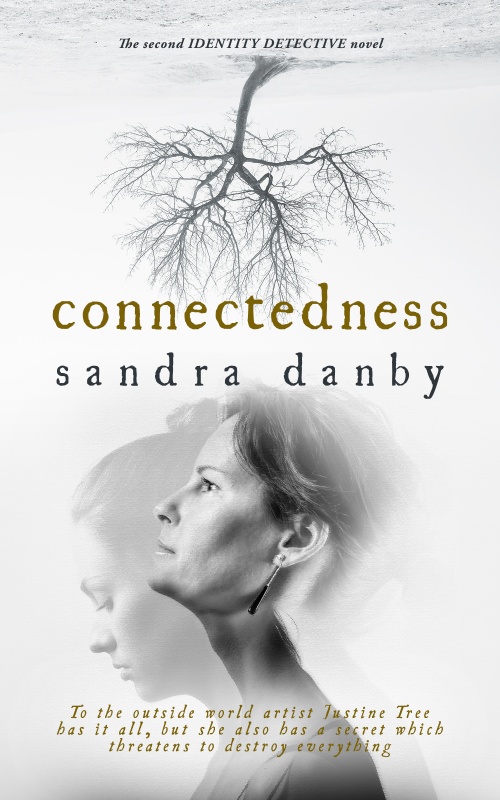 I am pleased to say hi to author, Sandra Danby. As well as sharing an extract with me today, she is also talking about her latest novel, Connectedness and the origin of her story.
I am pleased to say hi to author, Sandra Danby. As well as sharing an extract with me today, she is also talking about her latest novel, Connectedness and the origin of her story.
To the outside world, artist Justine Tree has it all but she always has a secret that threatens to destroy everything.
Justine’s art sells around the world, but does anyone truly know her? When her mother dies, she returns to her childhood home in Yorkshire where she decides to confront her past. She asks journalist Rose Haldane to find the baby she gave away when she was an art student, but only when Rose starts to ask difficult questions does Justine truly understand what she must face.
Is Justine strong enough to admit the secrets and lies of her past? To speak aloud the deeds she has hidden for 27 years, the real inspiration for her work that sells for millions of pounds. Could the truth trash her artistic reputation? Does Justine care more about her daughter, or her art? And what will she do if her daughter hates her?
This tale of art, adoption, romance and loss moves between now and the Eighties, from London’s art world to the bleak isolated cliffs of East Yorkshire and the hot orange blossom streets of Málaga, Spain.
Thanks for joining me today, Sandra. Over to you…
 When I was writing Connectedness, second in my ‘Identity Detective’ series of adoption mysteries, I didn’t realise how much I was writing about food. Then a blogger friend who reviewed the book sent me an email saying I had presented her with a difficult biscuit dilemma.
When I was writing Connectedness, second in my ‘Identity Detective’ series of adoption mysteries, I didn’t realise how much I was writing about food. Then a blogger friend who reviewed the book sent me an email saying I had presented her with a difficult biscuit dilemma.
While biscuits are something that remind Justine Tree of her childhood in Yorkshire, coffee is about romance in Spain. When she arrives as an art student in Málaga, Justine struggles to order a decent cup of coffee.
Then she meets Spanish student Federico who appreciates her difficulty and tries to help. I wrote this scene early in the genesis of the book and recreated it in our local bar in Spain, much to the bemusement of the waiter. I ordered six cups of coffee and tasted each in turn. The result was that I realised I liked café con leche, and my husband chose sombra. This is the coffee scene where Justine meets Federico for the first time.
****** start of extract*****
‘No quieres café?’ He looked at her as if she had asked for champagne.
Quickly Justine explained the difficulty she had ordering coffee, and then waited as Federico and the waiter exchanged a rapid dialogue interspersed with lots ofsí’sand no’s and much gesturing.
Finally Federico nodded. ‘Sí, vale.’
The waiter soon returned carrying a tray with six cups on it. Nodding first at Federico then at Justine, he retreated to the restaurant door beneath the shade cast by a large eucalyptus tree and watched.
Novel Kicks Writing Room: From The First To The Last
 When you first decide to write a book, we are told that beginnings and endings are important but how you get from one to the other is what keeps a reader interested.
When you first decide to write a book, we are told that beginnings and endings are important but how you get from one to the other is what keeps a reader interested.
For today’s exercise, use the following line to start (or use one from one of your favourite novels.)
“From the beginning, she was in love with him.”
Write it at the top of the page.
Then, write the following last line at the bottom of the page;
“She couldn’t move. She just continued to hold the knife.”
(Again, feel free to use an ending from a favourite novel as long as it’s different to the one the first line came from.)
Using about 1,500 words, fill in the middle from your first line to the last.
Novel Kicks Writing Room: Twenty Questions
 Today, the writing room will be looking at getting to know your character by having a game of twenty questions with them using the questions below. Not everything you write has to end up in your novel but it will give you a better overall knowledge of them and how they would feel and react to things.
Today, the writing room will be looking at getting to know your character by having a game of twenty questions with them using the questions below. Not everything you write has to end up in your novel but it will give you a better overall knowledge of them and how they would feel and react to things.
1. What do they look like?
2. What do they like to do to socialize?
3. How was their childhood?
4. One thing that really embarrasses them?
5. What group did they belong to at school?
6. What did they want to do when they grew up and what do they actually do for a job as an adult?
7. Name ten songs that are currently on their playlist?
8. Do they drink, smoke, take drugs?
A Moment With… Julie C. Gardner
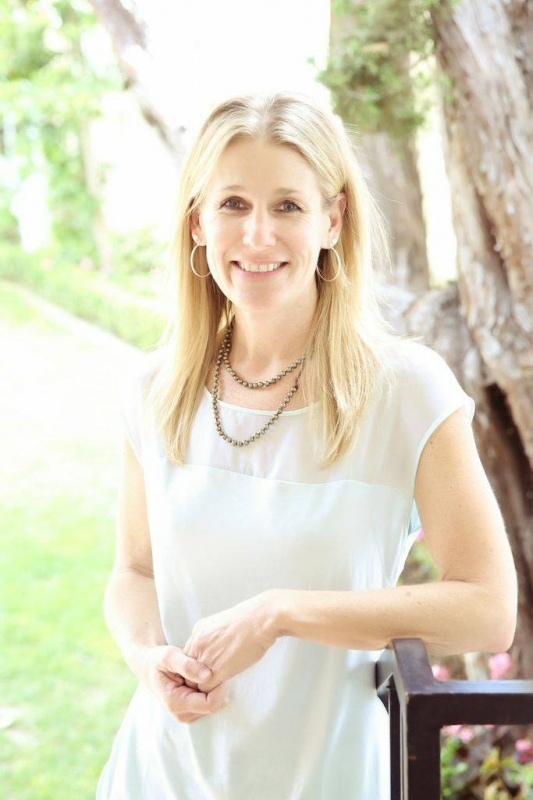 Forgetting Ophelia is the new novel from Julie C. Gardner (released today by Velvet Morning Press.) She’s joined me today to talk about her life in books. Over to you, Julie.
Forgetting Ophelia is the new novel from Julie C. Gardner (released today by Velvet Morning Press.) She’s joined me today to talk about her life in books. Over to you, Julie.
I owe my obsession with reading, at least in part, to my sister Nancy. More specifically to her tonsils. I was seven and my sister was six the year my family drove from California to Texas to spend Christmas with our cousins. On the way, Nancy broke out in yet another of her fevers, her throat swelling up, her tonsils the size of tennis balls. It was a truly miserable situation.
For me.
Why? Because Nancy, who was my only playmate on this road trip, was suddenly quarantined. No more alphabet games in the backseat of our car. No songs or hand-slapping routines.
On a pit stop at my Aunt Elaine’s house in Arizona, my aunt took pity on me and my loneliness, whisking me away to a local bookstore where she bought me The Secret of the Old Clock.
I curled up with my new mystery, gobbling the adventures of this titian blonde named…Nancy.
The love was instantaneous. I wanted to be a titian blonde. I wanted to BE Nancy Drew.
I read every book of hers I could get my hands on. Then the Trixie Belden series. Harriet the Spy. A Wrinkle in Time. Island of the Blue Dolphins. By the time I was ten, I decided to be Judy Blume, not merely devour all her books.
When I was in fifth grade, my parents took me to a bank where they were handing out free copies of James A. Michener’s Hawaii. The book was roughly the size of a toaster. As I announced my plan to read all 1,000 pages of this sprawling saga, my parents chuckled. “Go ahead!” (Of particular interest were the sexy scenes, since I’d recently watched my school’s puberty films.)
By then my sister had had her tonsils removed, and I’d moved on to Little Women, Jane Eyre, Pride and Prejudice, A Tale of Two Cities. A bevy of classics littered my nightstand and saved me from being completely boy-crazy. (Rest assured, I was still plenty boy-crazy. Just ask Nancy and my parents.)
A Moment With: Rhiannon Navin
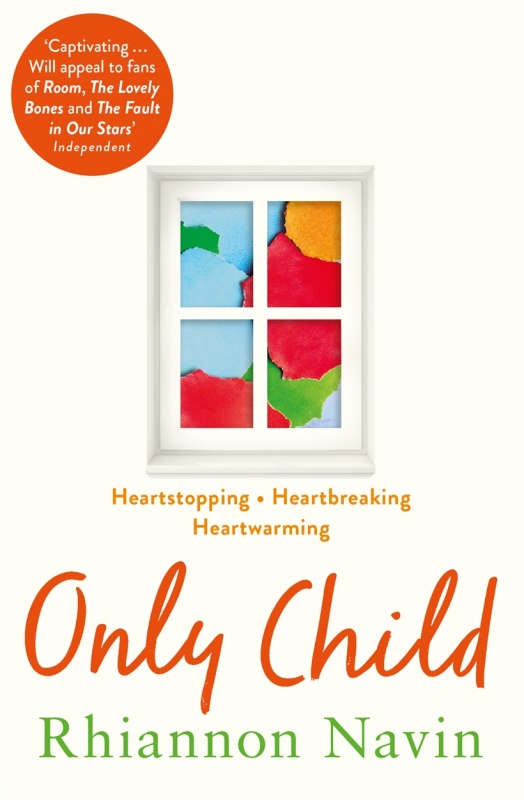 Only Child by Rhiannon Navin has been released today in paperback and I am so pleased to welcome her back to Novel Kicks. Thank you for joining me today, Rhiannon. What’s your writing day/space like?
Only Child by Rhiannon Navin has been released today in paperback and I am so pleased to welcome her back to Novel Kicks. Thank you for joining me today, Rhiannon. What’s your writing day/space like?
The short answer is: never the same. I’m a stay at home mum of three, so I always have to squeeze in time and space for writing between a million other things. I used to think that I needed to create this perfect scenario to get some writing done, hours of uninterrupted time and no distractions. But I’ve found that I actually need a lot of movement while I write. I can’t sit in one place for too long and I have to allow my mind to wander. So, it’s not unusual for me to have multiple writing “windows” throughout the day and each in a different location around the house.
What advice about writing would you give to your younger self?
To start sooner! My whole life, people have suggested that I try my hand at writing, but I never thought that would be something I could do or be good at until I sat down to write Only Child. And then I fell in love with writing so quickly. It’s become such an essential part of my life, basically from one day to the next, and it sometimes feels like wasted time that I spent almost 40 years not writing. But maybe I had to be in the right place in my life to be receptive. And maybe it took the right story to get me hooked.
What elements are needed for a good novel?
A good novel to me is one that makes me miss it when I’m not with it. I have to want to carry it around with me even if I know I won’t have time to read it. And I have to think about it long after I’ve finished it. It’s hard to say which elements in a novel have that effect on me. A different voice certainly, one that I haven’t heard before, or a perspective I haven’t considered before. The characters have to be real and imperfect; they have to be people I’d like to meet in real life. I like to walk away from a story having learned something. And if the story made me laugh—or cry!— bonus points.
About Only Child:
We went to school that Tuesday like normal.
Not all of us came home . . .
Novel Kicks Writing Room: Free Write Exercise
 For today’s writing room, I thought it was about time we did a free writing exercise/short story
For today’s writing room, I thought it was about time we did a free writing exercise/short story
If you have a subject and character in mind, feel free to write about that or you can use the prompt I’ve included below.
The story just needs to include dialogue, a proper conclusion and be no more than 1,500 words.
The prompt…
Your main character is in his sixties. He has been in the circus since he was sixteen making his way up the ranks to being the boss.
The circus has just arrived in a new town.
One of the younger staff members gets ill and needs to go to the hospital. A routine blood test reveals something that your character has wanted to keep secret.
